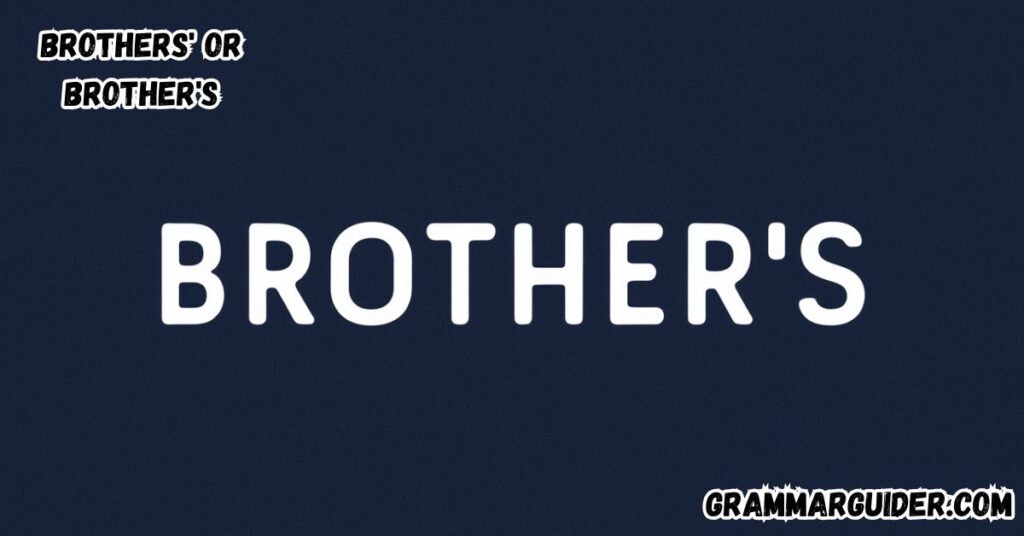In the English language, small differences in punctuation can change the meaning of a sentence completely. One such example is the confusion between “brothers” and “brother’s.” While both words refer to a male sibling, the way they’re used in sentences can drastically affect their meaning. Understanding when and how to use these two forms is essential to ensuring clarity in writing and speech.
In this article, we’ll explore the key differences between these two terms, give practical examples, and explain why it matters.
What is the Difference Between “Brothers” and “Brother’s”?
The two words might sound similar, but they serve different grammatical purposes.
Brothers – The Plural Form
Brothers is the plural form of the word brother. It refers to more than one male sibling. When you’re talking about two or more brothers, you use brothers.
Example:
- “I have two brothers who live in New York.”
- “My brothers are coming over for dinner tonight.”
In these examples, we are simply referring to multiple siblings who are male.
Brother’s – The Singular Possessive Form
Brother’s is the possessive form of the singular noun brother. It shows ownership or something belonging to one brother. The apostrophe indicates possession.
Example:
- “This is my brother’s favorite book.”
- “Do you know where my brother’s keys are?”
Here, brother’s tells us that something belongs to one brother, whether it’s a possession, characteristic, or something related to him.
Understanding the difference between the two is vital for clear communication. Using one incorrectly in place of the other can lead to confusion.
Why This Difference Matters: Miscommunication and Clarity
Imagine you’re sending an email about a family event, and you write:
- “My brothers’ house is huge.”
- “My brother’s house is huge.”
At first glance, these two sentences seem similar, but they convey different meanings.
In the first example, you’re implying that the house belongs to multiple brothers.
In the second, you’re referring to a house owned by just one brother. The placement of the apostrophe changes the meaning of the sentence, highlighting the importance of understanding how to use these forms correctly.
Let’s dive deeper into how these forms work.
Brothers – The Plural of Brother
The word brothers refers to more than one male sibling. Whether you’re discussing two brothers or ten, the word remains the same.
Examples of Brothers in Sentences:
- “Jake and his brothers are coming to the party this Saturday.”
- “My brothers are much older than me.”
- “Do you think brothers should share everything?”
In all these cases, the subject is plural, meaning the speaker is talking about more than one brother.
You might also come across phrases like “The brothers meaning” when discussing a broader sense of brotherhood or the role of brothers in society. Here, brothers refers to male siblings in general, and understanding this context can help avoid confusion.
Brother’s – The Possessive Form
On the other hand, brother’s indicates possession, showing that something belongs to one brother. This is crucial in distinguishing whether you’re talking about one brother’s property or something related to them.
Examples of Brother’s in Sentences:
- “This is my brother’s guitar.”
- “I like my brother’s style.”
- “Did you borrow my brother’s pen?”
Here, we’re talking about things that belong to a single brother.

When to Use “Brothers'” (Plural Possessive)
Brothers’ is the possessive form of the plural brothers. This means something belongs to multiple brothers. The apostrophe comes after the s, indicating possession by more than one brother.
Example of Brothers’ in Sentences:
- “The brothers’ house is very spacious.”
- “I borrowed my brothers’ bikes.”
- “The brothers’ opinions differ greatly on the issue.”
In these sentences, we see that the apostrophe is placed after the s in brothers’, showing that the possession belongs to multiple brothers.
The Importance of Correct Usage: Scenario Examples
Let’s now consider real-life examples where using brother’s vs brothers’ could impact the clarity of the message.
Example 1: Email to a Friend
Incorrect:
“Hey Sarah,
I’m planning to visit my brothers’ house this weekend. It should be fun! They have a pool.”
- Here, you might confuse the recipient into thinking that you have one brother with a large house, when in fact, you’re referring to a family home owned by multiple brothers.
Correct:
“Hey Sarah,
I’m planning to visit my brother’s house this weekend. It should be fun! He has a pool.”
- Now, the reader knows you’re talking about one brother and his house specifically.
Example 2: Text Message to a Sibling
Incorrect:
“Hey, can you pick up brother’s clothes from the laundry?”
- The text suggests the clothes belong to a single brother, but in some situations, you might have meant multiple brothers.
Correct:
“Hey, can you pick up the brothers’ clothes from the laundry?”
- Now, it’s clear that the clothes belong to more than one brother.
The Etymology of “Brother”
Understanding the etymology of “brother” helps to appreciate its historical context. The word brother traces back to Old English “broþor” and Proto-Germanic “broþar.” Over time, the meaning has expanded and evolved, but the concept of brotherhood—family bonds and shared relationships—has remained the same.
The Significance of Understanding “Brother’s vs Brothers'”
Confusing brother’s and brothers’ can create ambiguity in communication. Using the correct form not only helps in clear expression but also enhances the professionalism and precision of your writing. For example, in a business email, you wouldn’t want to say:
- “Please send the invoice to brother’s account.”
When you likely mean: - “Please send the invoice to the brothers’ account.”
The wrong use could cause confusion and potentially lead to serious misunderstandings.
Plural of Brother – More Than Just Grammar
The plural of brother—brothers—may seem straightforward, but it has significant cultural and personal importance. In many societies, the idea of brothers forms the foundation of the family unit, and understanding how to refer to multiple brothers properly can also reflect an understanding of these relationships.
In different languages, the term brother can also have different forms. For instance, in Spanish, the word for brother is “hermano.” The plural form is “hermanos.” The possessive forms would be different, depending on the language’s structure, but the essence of the relationship remains the same.
A Handy Guide to Understanding the Difference
Here’s a simple table to help differentiate between brother’s, brothers’, and brothers:
| Term | Meaning | Example |
|---|---|---|
| Brothers | Plural form of brother (more than one brother). | “My brothers are visiting.” |
| Brother’s | Singular possessive form (something belonging to one brother). | “I borrowed my brother’s pen.” |
| Brothers’ | Plural possessive form (something belonging to multiple brothers). | “The brothers’ toys are here.” |
Final Thoughts: Get It Right, Every Time
Getting brothers vs brother’s correct isn’t just about grammar; it’s about ensuring your message is as clear and precise as possible. Whether you’re sending an email to a friend, writing a report, or just chatting with family, using the correct form will keep your communication smooth and effective.
By understanding when to use brothers’, brother’s, and brothers, you can avoid common mistakes that may confuse your audience. So next time you talk about your brothers, remember: context matters, and small details make a big difference in how you’re understood!

Harley Rose is a seasoned expert in English grammar and writing tips, blending years of knowledge and a love for language into her work. With a sharp eye for detail and a talent for making grammar accessible, Harley shares practical insights that help readers write with precision and flair. Her content is ideal for anyone looking to strengthen their writing skills and express themselves with confidence.

